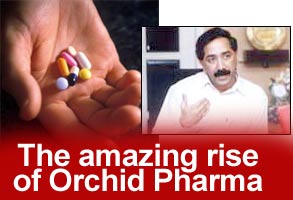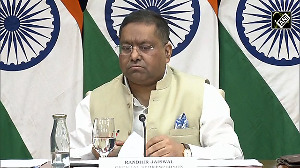
The Chennai-based pharmaceuticals major, Orchid Chemicals & Pharmaceuticals Ltd, is the youngest pharma firm in India to bag the ISO 9001:2000 certification. With exports spanning more than 75 countries, it is the largest manufacturer-exporter of cephalosporin bulk actives in India and is ranked amongst the top 5 cephalosporin-producers globally.
Orchid is a first-generation enterprise founded in 1992 by K Raghavendra Rao, who is also the firm's managing director.
After passing out from the Indian Institute of Management-Ahmedabad in 1977 at the age of just 19, K Raghavendra Rao had no plans to be an entrepreneur. He joined Kwality Ice Creams in Mumbai, and within 18 months, he converted one of its manufacturing units in Ahmedabad into a profitable venture.
Soon, he found he would not be able to go beyond a certain level in a small company, and joined Ashok Leyland in Chennai. But in no time, he found it too big for his liking.
The next move was to a medium size company 'which is in the growth phase,' to grow with it.
He joined Standard Organics in Hyderabad and that was his first exposure to pharmaceuticals. He joined the company at the age of 25 as a project manager and soon became its vice president, operations. He, along with his team, put up a bulk drug manufacturing plant, a formulation plant and medical diagnostic centres.
"That was during 1986-87. That was where my entrepreneurship blossomed. I felt if I could lead a team to make things happen from scratch for other people and other companies, why should not I start something on my own?" Rao remembers.
To realise his dream, he had to have capital. So he went to Oman, and "sold his services for a better capital." His plan was to make some capital, come back to India and start a project. He helped the Oman company diversify into pharmaceuticals, steel and readymade garments. The company whose revenue was less than $2 million rose to $80 million in just four years.
In 1993, with 'some' capital, and lots of experience and confidence, Rao came back to India and started Orchid Chemicals and Pharmaceuticals in Chennai.
"I chose pharma because I thought, as long as people are there, some medicine or the other will be required. Secondly, I felt the versatility of pharma manufacturing enterprise is far greater. It has many-to-one and one-to-many correspondences, which means, with the same centrifuges, reactors and dryers, with their supporting systems in engineering and refrigeration, just by changing the parameters, you can do many different products. These are the two reasons that made me decide the field of operation."
The next major decision Rao took was to make Orchid a 100 per cent export oriented company.
"It was primarily because he wanted the culture in the company at the operating level to be for 'one globe, one market, only one way of doing things and only one quality platform' on which the company has to be built."
"It was more of a cultural and attitudinal issue. We saw the international market as our market place and made use of the advantage of low cost production in India."
So, in Rao's opinion, the decision to create an export oriented company had only advantages and no disadvantages.
Initially, Rao chose to manufacture bulk drugs and decided to export to four countries in the neighbourhood, including China.
The company started off with a capital of Rs 12 crore (Rs 120 million), planning to achieve sales of Rs 28 crore (Rs 280 million), Rs 32 crore (Rs 320 million) and Rs 37 crore (Rs 370 million), respectively in the first three years.
What they achieved was far in excess of their own estimates, with sales ringing in at Rs 43 crore (Rs 430 million), Rs 121 crore (Rs 1,210 million) and Rs 192 crore (Rs 1,920 million), respectively.
Now after ten years, Orchid's annual sales are at Rs 542 crore (Rs 5,420 million). The company projects a turnover of Rs 1,000 crore (Rs 10 billon) by 2005.
From exporting to just four countries, Orchid has spread its presence into more than 70 countries.
Having started with just one product -- cephalosporin -- Orchid now has 20 products to its credit.
From five employees, the workforce has grown to more than a 1,000. All in a short span of just 10 years.
"We achieved it because Orchid is a quality company. Go to the market and ask what's Orchid known for. They won't say, if you want a very cheap product, at a very competitive price, go to them. They will say: 'It's a good antibiotic company. It's a company specialised in cephalosporin.' We have quite a large range to offer now. It's a high quality producer." Rao has every reason to be proud of his company.
The shift from manufacturing bulk drugs to developing their own drugs and formulations did not happen all of a sudden. Rao knew there would be a long gestation period if they started basic research or tried to access a regulated market from day one of the company's inception.
"We knew all along that research is as important for a pharma company but being a first generation company, we had to do things in a step by step manner."
So, Rao decided to plunge into research only from the year 2000. At the same time, Orchid decided to go to the regulated market with the same bulk drugs they manufactured. The company presented a five-year plan to Schroeder and IFC, Washington.
By 2001 and 2002, the entire infrastructure was implemented. By 2003, they started seeing some results.
As far as research is concerned, Orchid has decided to specialise in three therapeutic areas: infection, inflammation and diabetes.
The two in-house research projects that are going on at the Orchid laboratories are on oxyzolidinone and cox-2 inhibitor molecules. Oxyzolidinone, considered better than cephalosporin, is the latest in antibiotics.
"Any infection is accompanied with inflammation. Pain and inflammation go together. So, we decided to do some research in that area too, and come up with our own molecule. There's no cox-2 inhibitor in the world as of today, which is orally active, which reduces inflammation. We feel we can find a molecule." Rao is confident of success.
As far as the diabetes molecule is concerned, Orchid has entered into a research joint venture with Bexel Pharmaceuticals Inc in the United States and the research project is going on in the US laboratories.
"They had the molecule and were looking for pre clinical back up, and also financial support. We have all that, and we also want to get into the high growth areas."
Now, Orchid has three molecules. The in-house drugs, oxyzolidionone and an anti-inflammatory molecule will be taken up for Phase-1 trials in Europe, and eventually to the US by 2005. But the anti-diabetic drug is already in Phase-1 trials in Europe, and will complete the trials in April 2004.
The objective of the company is to complete Phase-2 trials, establish proof of its working in an affected human being and then licence it by the end of this year.
After that, Rao wants to move further in the same area. For example, diabetes is leading to obesity, as most of the drugs are fat inducing drugs. So, Orchid wants to come up with an anti-obesity molecule.
He also has plans to formulate the bulk drugs and sell the products in dosage form. It is for this purpose that Orchid has built a dosage form plant near Chennai. The dosage form will be finally marketed in the US. Rao is quite sure about not going to unrelated diversification.
Orchid has joint ventures with a few Chinese companies for manufacturing and marketing of their drugs. On the other hand, collaboration with US companies is for purposes of research.
"The reason why we chose US companies for collaboration in research is because they are already into it whereas on the manufacturing side, China is a large market. But the US market constitutes more than half of the revenue of the pharma business -- $420 billion. So, any pharma company worth its salt must be in the US, and India has a big role to play in the US."
Analysing the performance of his company that started just 10 years ago with just Rs 12 crore, Rao cited three reasons for its brilliant success.
"One is the choice of product range and focus. Second is the rapid way we have added products. Third, we knew what was in our control, and what was not. What is in our control is, we can add products, we can add markets, etc but what we cannot control is competition and market price. Last but not the least, the quality of the people we have, right from the beginning, has made a big difference in the company."
Though he says decisions are taken collectively by the top management team, Rao admits that the buck finally stops at his desk.
Any future plans?
"Our objective is to encash on the infrastructure that we have created on the knowledge side, the physical-asset side and on the documentation-and-registration side. We have to convert all that to value in future. That is our goal for the next two to three years."
The strength of Indian pharmaceutical industry, according to Rao, lies in the areas of chemistry, manufacturing, and regulatory compliance. The maximum number of US-approved plants outside the US is in India.
"I would say the pharma sector will do better than information technology. The reason for this belief is not because we are in pharma, but because there is a fundamental difference between how IT operates out of India and how pharma operates out of India. It is services versus products," says Rao.
"As long as you come up the value chain in terms of products, the rate of growth and the actual delivery that you do is much more valuable and non-replicable compared to a service you can provide. It is going to take time but it is going to pay in a much more handsome manner than IT," he says.
Photograph by Sreeram Selvaraj







 © 2025
© 2025